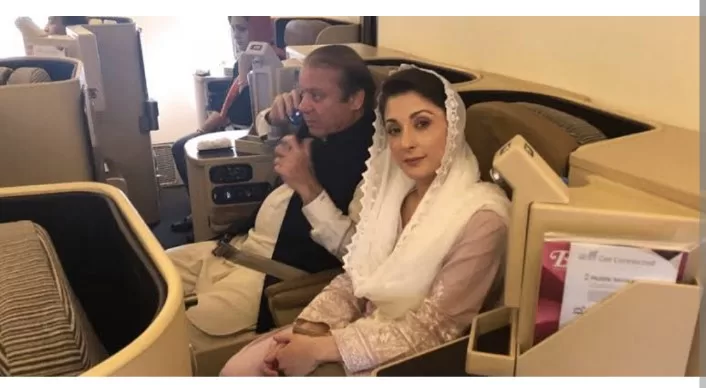The return of Nawaz Sharif, a three-time former Prime Minister of Pakistan, has marked a significant political development in the country. Sharif, who has spent four years in self-imposed exile, arrived in Pakistan, positioning himself for a notable political resurgence in the lead-up to the general election scheduled for January.
The past few days saw Sharif in Dubai, from where he departed on a chartered flight brimming with journalists. He landed in the capital city of Islamabad around 1:30 pm (0830 GMT), as reported by local media outlets.
Sharif, confidently addressing reporters before embarking on his journey, stated, “We are completely ready for elections.” He then went on to express his dismay about Pakistan’s current state, lamenting how the country, which should have been prosperous, has regressed. “How did we get here? Why did it come to this?” Sharif pondered.
It is widely believed by analysts that Sharif’s return was facilitated through negotiations with the influential military establishment. The military had taken stringent measures against Imran Khan’s party after their relationship soured, leading to Khan’s ouster last year.
The next stop for Sharif is Lahore, a sprawling megacity in the eastern part of Pakistan. Supporters have eagerly gathered to welcome him with the streets adorned in green and yellow party banners, posters, and flags.
To manage the expected crowd at the Greater Iqbal park in Lahore, where Sharif’s homecoming rally is set to take place, more than 7,000 police officers have been mobilized, according to a senior officer on site.
One of the enthusiastic supporters, 18-year-old Razi Ullah, articulated the anticipation surrounding Sharif’s return: “I’m here to welcome my leader. The inflation is very high, and poor people are desperate. God has given him a chance to come back and turn things around. He’s done it before.”
Sharif’s return had been a topic of anticipation for several months within the PML-N party, which anticipates that his political influence and the “man of the soil” charisma will reinvigorate the party’s popularity.
Nonetheless, it is important to note that Sharif carries a conviction for corruption, along with an uncompleted prison sentence.
The Islamabad high court had earlier this week granted protective bail to Sharif until Tuesday, thereby removing the immediate threat of arrest upon his return to Pakistan.
Sharif had held the position of Prime Minister on three occasions but was ousted in 2017, subsequently receiving a lifetime disqualification from politics due to his conviction on corruption charges.
He served less than a year of his seven-year prison sentence before receiving permission to seek medical treatment in the United Kingdom. Notably, he chose to ignore subsequent court orders during Imran Khan’s tenure as Prime Minister, which added a layer of complexity to his situation.
The turning point for Sharif was when his brother, Shehbaz Sharif, was in power and his government orchestrated changes to the law, including restrictions on the disqualification of lawmakers from contesting elections, limiting it to a five-year period.
Analyst Zahid Hussain suggests that Sharif’s return was likely smoothed by an agreement reached between the military establishment and his party, aimed at averting significant legal impediments.
Sharif’s political fortunes have continually oscillated in tandem with his relationship with Pakistan’s potent military establishment, known as the country’s true powerbrokers.
In Pakistan, it’s commonplace for politicians to become ensnared in legal proceedings that rights monitors assert are orchestrated by the formidable military, which has ruled the nation directly for more than half of its history, maintaining an enduring grip on authority.
Sharif has earned the moniker “the Lion of Punjab,” which is the country’s most populous province and his stronghold. He is also known for the grandeur of his political events, where big cats are paraded to garner support.
Nevertheless, his formidable task lies in winning over an electorate weary of dynastic politics and a youthful population that has been swayed by Khan’s social media-savvy party.
Political analyst Ayesha Siddiqa outlines Sharif’s challenges, which include establishing himself and his party as viable alternatives to Imran Khan’s already popular platform and addressing the nation’s economic challenges.
It’s important to note that Pakistan is currently under a caretaker government as it prepares for the upcoming elections.







